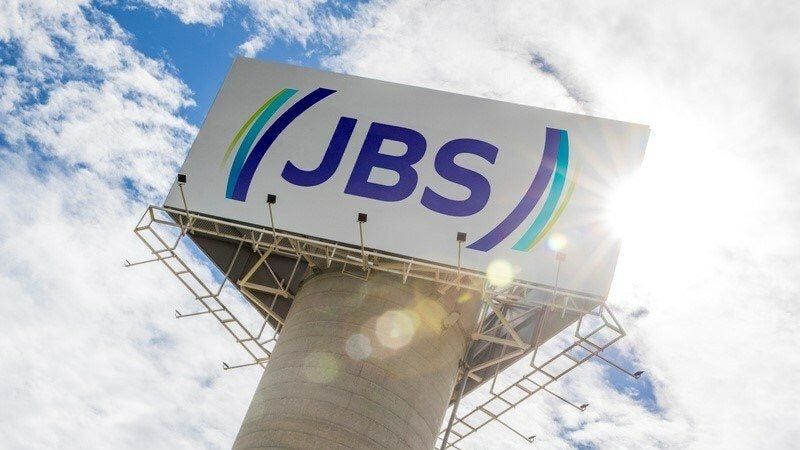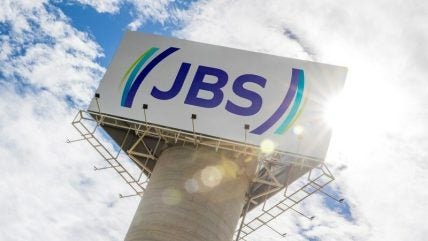

JBS‘s targets on emissions have been removed from the website of the Science-Based Targets Initiative (SBTi), sparking more questions about the meat giant’s efforts to make its business more environmentally sustainable.
The SBTi is an international global that helps businesses set emissions reduction targets in line with science. Food companies including Nestlé and PepsiCo have had their net-zero targets approved by the organisation.
However, the SBTi’s website now shows JBS as “commitment removed”. The Brazil-based meat processor has been struck off the register in relation to its commitments to setting “a near-term target” and to setting “a net-zero target”.
In 2021, JBS announced its intention to achieve net-zero greenhouse gas (GHG) emissions by 2040.
In response to the SBTi’s move, JBS said the organisation’s changed requirements and draft methodologies have “fundamentally altered the previous understandings between JBS and SBTi”.
Two weeks ago, New York State Attorney General Letitia James filed a lawsuit against JBS’s US arm over allegations the company has been making environmental claims that deceive customers.
Access the most comprehensive Company Profiles
on the market, powered by GlobalData. Save hours of research. Gain competitive edge.

Company Profile – free
sample
Your download email will arrive shortly
We are confident about the
unique
quality of our Company Profiles. However, we want you to make the most
beneficial
decision for your business, so we offer a free sample that you can download by
submitting the below form
By GlobalData
James called on the New York County Supreme Court to demand JBS drop its 2040 net-zero pledge, arguing it had “repeatedly and persistently made unsubstantiated and misleading environmental marketing claims to New York consumers”.
When contacted, SBTi said it “cannot comment on individual companies” but directed Just Food toward the commitment compliance policy, which details how commitments are removed or expired, on its website.
The policy states that to comply with the SBTi’s guidelines a company or financial institution indicates it “will work to set a science-based emission reduction target aligned with the SBTi’s target-setting criteria”.
Responding to the SBTi’s action in a statement sent to Just Food, the Brazilian company said: “JBS is in the process of setting science-based targets to reduce and eliminate carbon emissions across all scopes in our shared value chain.
“In 2021, JBS committed to set voluntary targets with the Science Based Target Initiative and we have worked diligently to establish those targets over the past two years. During this time, SBTi created new requirements and draft methodologies for agriculture-based companies that fundamentally altered the previous understandings between JBS and SBTi. While JBS is therefore moving forward with its environmental goals outside of the SBTi framework, such [a] shift does not alter JBS’s climate reduction objectives.”
It added: “Our ambition to set targets based on sound science has not changed. We are actively partnering with multiple, credible third parties to set actionable targets and will release the results of these efforts – our climate action plan and emission reduction road map – in the near future.
“JBS will also continue to partner with farmers, NGOs, universities, customers and other stakeholders to identify ways to reduce agricultural emissions, combat global food insecurity and enhance the sustainability of agricultural systems. We believe agriculture has an essential role to play in the climate change solution and that companies like JBS can and should help lead collective action.”
Environmental campaign groups have been quick to praise the SBTi for refusing to validate JBS’s climate control efforts.
Alma Castrejon-Davila, a senior campaigner at the Changing Markets Foundation, said: “It is great to see that finally they [SBTi] have chosen to do the right thing and remove the commitment from a major polluter like JBS.”
And Gemma Hoskins, senior director in the UK at global advocacy organisation Mighty Earth, said: “JBS has emissions equivalent to that of Spain and is a known Amazon forest destroyer. Mighty Earth and others are still finding numerous cases of deforestation linked to JBS’ beef supply chain in Brazil, some of which are located within the ancestral lands of indigenous communities.”
Mighty Earth and fellow campaign group Global Witness have also opposed JBS’s plans to list on the New York Stock Exchange due to what they suggest are historic links to deforestation in the Amazon rain forest.

